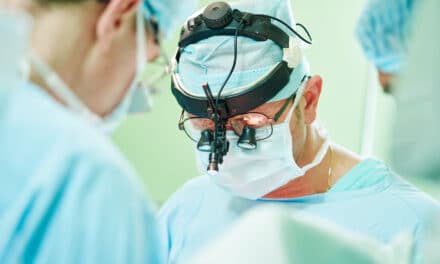In honor of Breast Cancer Awareness Month, Plastic Surgery Practice Co-Chief Editor Keri Stephens sits down with breast implant explant therapist Amanda Savage Brown, PhD, LCSW, author of Busting Free: How to Liberate Yourself from the Quest for Better Breasts Before, During, and Long After Explant. A scientist turned psychotherapist, Savage Brown shares her personal explant journey—which occurred after one of her breast implants ruptured—and why the mental health aspect of it is so important. She also discusses how explanting post-mastectomy can be particularly emotional for breast cancer patients.
This podcast also delves into breast implant safety—a topic that has been in the headlines lately due to the U.S. FDA’s recent announcement that breast implants may be linked to additional cancers, such as squamous cell carcinoma—and how such concerns may lead to more women explanting. Finally, Savage Brown shares details about the upcoming Breast Implant Health Summit 2022, which takes place from October 20-22, and why plastic surgeons should partake in this groundbreaking event.
Podcast Transcript
Keri Stephens:
Hello, and welcome to the Plastic Surgery Practice Podcast on the MEDQOR Podcast Network. I’m Keri Stephens, the Co-Chief Editor of Plastic Surgery Practice. In honor of Breast Cancer Awareness Month, today I’m talking to Dr. Amanda Savage Brown, the founder of BRITE Inner Healing, and a Breast implant, explant therapist. She’s also the author of Busting Free: How to Liberate Yourself From The Quest for Better Breasts Before, During, and Long After Explant, which came out in August.
Keri Stephens:
Amanda, thank you for joining us today.
Dr. Amanda Savage Brown:
Thank you so much for having me. I appreciate it. I’m excited to be here and to talk with you today.
Keri Stephens:
Of course. Okay. To start, can you please share about your personal explant journey, and why the mental health aspect of it is so important?
Dr. Amanda Savage Brown:
Yeah, absolutely. So I got breast implants in 2006, and I had them for about 12 and a half years. And I explanted for many different reasons, but my ultimate change catalyst was noticing a sudden shape change. So I knew that one had ruptured. And when I was going through my explant journey, I connected with tens of thousands of other women that were going through their journeys as well. On my consultations, doctors were telling me that I shouldn’t believe things I had read online. And I hadn’t really read anything online, because at that point I hadn’t really been in social media groups.
Dr. Amanda Savage Brown:
So when I went for my consult is when I learned that there was so many women moving through explant and most were moving through it for breast implant illness related reasons, or BII. And so when I started looking into BII and saw that this was an emerging concern for women, and looked at my experience on my consultations with doctors who were telling me not to worry … and I hadn’t really been worried about it. Like I said, I was explaining for other reasons. I just became very curious about all of this. I looked into it, learned a lot about it. And I went through the whole journey with the eyes of a psychotherapist, and I’m also a former United States Public Health Scientist.
Dr. Amanda Savage Brown:
And so I started seeing a bunch of gaps in the psychosocial care of women on these journeys. And how there’s so much value placed on breasts, that we can surgically alter our bodies to augment or restore or reconstruct them. But then when it comes time for us to remove them, for any reason, whether that’s a rupture or a recall or BII. Or you’re just done with them, they’re uncomfortable. Whatever your reason, there’s a paucity of resources available to help you move through the mental, emotional, and social side of that change.
Dr. Amanda Savage Brown:
So that’s what inspired me to translate all the scientifically validated tenants that I use in my private psychotherapy practice, specifically for women on, I call it the Breast Implant Through Explant, or BRITE Journey. And then I took all of that work and I made the first legitimate self-help book for navigating the inner journey of breast implant removal.
Keri Stephens:
So, yes. I would love to talk about your book. What surprised you most about writing this book? And just, what are some takeaways that you found that you had no idea would happen before you started?
Dr. Amanda Savage Brown:
Honestly, for me personally, I had a pretty outdated idea of writing a book and raising awareness for it. And so that was actually the biggest surprise, because I see online hundreds of thousands of women that are clamoring for this kind of support. Women who are concerned about partner abandonment. Women who are concerned about never having told their children that they’ve got breast implants and now they’re going to have a body altering surgery to remove them. Women who feel guilty because they have breast implants and they believe that it’s causing systemic problems for their health. And it’s really impacting the way that they’re showing up to their partner or as a mother. And I mean, the list goes on and on.
Dr. Amanda Savage Brown:
And so I see all these women who want and deserve full, complete holistic care as they’re moving through this, and it’s difficult for me to raise awareness that this resource is there for them. And you might be asking me that question in terms of what did I learn or what surprised me most about … content-wise, in terms of moving through this. But really, it’s been more of a practical surprise for me, is this resource is here, how do I make it known to the women? And surgeons are going to play an important part in that. This is a sensitive topic, and women will go see their surgeons and talk with their surgeons about this. And so helping surgeons be aware that this resource exists is key. It’s very, very important.
Dr. Amanda Savage Brown:
And a lot of surgeons, explant surgeons in particular, end up shouldering the burden of the mental and the emotional and the social concerns of women who explant. And they may not have the staff or the time available to fully meet these women’s needs. So finding a way to get Busting Free as a recognized resource for the surgeons to be able to get that to their patients is going to be just a win for everyone.
Keri Stephens:
No, definitely. Breast implant safety, like you mentioned, has been in the media now a lot. Especially with the FDA recently saying that breast implants may be linked to additional cancers, such as squamous cell carcinoma. Have you seen an influx of patients coming to you that are looking to explant post this news?
Dr. Amanda Savage Brown:
The news came out about two weeks ago, so I haven’t personally in my practice been contacted about that in terms of, I’m scheduling my explant because of this. I have had women reaching out to me saying, this scares me. What does this really mean? Can you level with me? Can you translate this for me? Should I get my breast implants out? So it’s another great example of why the psychosocial side of this is so important because in 2021, the FDA put out a boxed warning on breast implants. That is their highest alert for safety concerns. And then we had the breast implant associated lymphoma, and now we have breast implant associated squamous cell carcinoma. And so women who have them in their bodies are wondering, what does this mean to me?
Dr. Amanda Savage Brown:
The FDA also, if you go to their website and you look through things to consider before getting breast implants, they acknowledge that there are systemic issues, which is commonly known as breast implant illness. And then there’s also recalls that have been happening with breast implants. And so there are millions of women right now with breast implants in, and they’re all wondering, what does this mean, and what should I do? And how can I keep myself safe while I have these devices in my body? And many of the women love having their breast implants. They’re not looking to get them out. But when they run into this news, they’re very understandably concerned about what that means.
Dr. Amanda Savage Brown:
And so, yeah. There’s been a lot of conversation and concern around what exactly does that mean for the average woman that’s got breast implants?
Keri Stephens:
Absolutely. And this is Breast Cancer Awareness Month, so I’d be remiss to not mention just the emotional journey it would be for a breast implant … or a breast cancer survivor to explant. Because for someone that got implants for cosmetic reasons, they have something left over. I know that there’s changes to the breast that will happen, but they’ll have something.
Keri Stephens:
But for a breast cancer patient or someone like myself, a previvor who had a double mastectomy, to explant would be to have no breasts whatsoever. Can you talk about that emotional journey for them? Because it definitely feels a little different.
Dr. Amanda Savage Brown:
Absolutely. And I appreciate you bringing that up. In some ways, the explant journey has many, many shared concerns and considerations, irrespective of why you got implants or why you’re removing them. And in other important ways, like you just mentioned, there are some differences, and important ones between women who explant after augmentation or restoration, and women who are, I say explanting to flat. And the explanting to flat journey has that. It’s that interim period where breast implants were viewed as staving off this emotional loss of breasts. And they are offered to breast cancer patients, or previvors, they’re offered to them as these solutions, right? To help you feel whole and complete and like a woman.
Dr. Amanda Savage Brown:
And so when a woman has gotten breast implants for that reason after mastectomy, and she’s had that messaging coming at her … I know a lot of breast cancer patients who reconstructed with implants who are told things like, you’re too young to not have breasts. You’ve got to do this reconstruction. And so that all these things get into that woman’s mind and heart. And then when things evolve for her, and let’s say breast implants aren’t working out well for her, they’re uncomfortable, she doesn’t like them, she’s having too many re-operations. Or she starts to develop some kind of health concerns. Then when she explants to flat, she’s now going into that with all of those additional words that were said to her. That you’ve got to have these to be whole and complete and a woman. And that you’re too young to not have these, or whatever it is. Now she’s bringing all that forward with that loss.
Dr. Amanda Savage Brown:
And so being able to help women move through that in a completely different way is as important as surgically delivering them to a beautiful aesthetic flat closure. So being able to help women heal inwardly. And like Busting Free, the book that I wrote, the goal of that is to liberate women who want to be liberated from the idea that they need to have their breasts to be full, complete, and whole. Or that their breasts need to appear a certain standardized way in order for them to be sexy, desirable, and complete.
Keri Stephens:
Thank you. I’m so glad you said that. And I was also told the same thing, you’re too young to not have breasts. So I really, really hear what you’re saying. And I know our readers and listeners will really appreciate that too.
Keri Stephens:
So as a last question, this podcast … The MEDQOR Podcast Network is for all health professionals, but the PSP side is really for plastic surgeons. So what do you want to tell plastic surgeons about this, about the emotional journey women go through with explanting? Because I don’t think it’s been discussed enough, so I’m really glad you have your book.
Dr. Amanda Savage Brown:
It hasn’t been discussed enough, and certainly not broadly. So there are some plastic surgeons who specialize in explant and they understand. They are holding these conversations with women who are moving toward explant with concern over what that means for them. How will post-explant intimacy be? How will they view themselves moving forward? Either as an explant to flat, or someone who potentially has distorted post-explant breasts. And so there’s a subset where there is awareness.
Dr. Amanda Savage Brown:
The rest of them, what I would message to them is a couple of things. One, I know that the majority of patients who are explanting right now are pursuing it because they have concerns about their systemic health. And I know that that is a controversial issue. And so rather than dismissing a patient, or wanting to comfort her, but perhaps inadvertently patronizing her or gaslighting her, I would urge everyone to approach this with curiosity and listen to the patient. And maybe reach out to other colleagues who are very experienced with this, who are doing research.
Dr. Amanda Savage Brown:
I would absolutely urge all of these surgeons to look at the Breast Implant Health Summit that is happening at the end of October. You can just go to the breastimplanthealthsummit.com, and that is the … it’s the leading edge. It is by practitioners, for practitioners. It is research that is non-biased, that is not funded by breast implant manufacturers. It is just people who are frontline doing the surgeries … or doing the research. And looking at breast implant safety.
Dr. Amanda Savage Brown:
And so I would just encourage providers, surgeons to look at that information and to form their own opinion and get it straight from the source of people who are out there doing the work, interacting with the patients, seeing things with their own eyes. And be able to come to their own conclusions that way.
Keri Stephens:
Thank you so much. Amanda, where can people find you?
Dr. Amanda Savage Brown:
You can find me at my website, which is my name. It’s amandasavagebrown.com, and everything is there. There’s a landing page for Busting Free, so you can learn more about that book. I created an online resource library with guided meditations, guided audios, different exercises. Those are click-and-play. I don’t email gatekeep them. So any patients that doctors have who they feel would benefit from this kind of support, you can refer your patients right to bustingfreeonline.com and it takes them right to that place.
Dr. Amanda Savage Brown:
And there’s many other resources on there for women who are considering explant. There’s a free ebook that teaches you how to study yourself, because we do get overwhelmed when we’re thinking about this change. And there’s a holistic explant planning checklist, so it helps patients consider and move through the mental, emotional, social side, as well as preparing for surgery. So amandasavagebrown.com is definitely the best place to start for this kind of support.
Keri Stephens:
Awesome. Thank you so much, Amanda. This was super informative. And to our listeners, thank you for joining us as well. As always, be sure to subscribe to the MEDQOR Podcast Network to keep up with the latest Plastic Surgery Practice Podcast episodes. And check out plasticsurgerypractice.com for the latest industry news. Until next time, take care.





